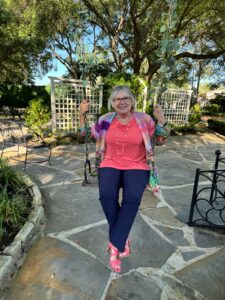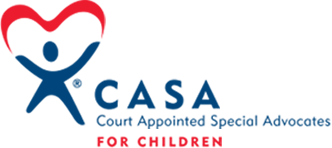April 2024 Advocate Spotlight: Peggy Thurman
We invite you to meet Peggy Thurman, nominated by her Case Supervisors, Allison Conner and Destin Hudek. Peggy has been an Advocate since 2020, serving on eleven cases!
“Peggy is an outstanding Advocate,” Allison said. “She cares deeply about the children she serves and strives to work with their families and the professionals to determine their best interests. Peggy is always willing to take on a case, no matter the challenges.”

We asked Peggy to share her experience as an Advocate.
Is there anything unique about your background that contributes to your approach to advocacy?
I’m retired from the oil and gas industry. I’ve lived overseas for several years. I’m a grandmother now.
How did you become interested in volunteering as an Advocate?
I saw in a local newspaper that [Recruiting Manager] Shellie [Tyrrell] was having a Conversations with CASA event. I googled it and thought, “This sounds right for me.” I met with Shellie, and before I knew it, I was signed up.
Did you have any reservations about volunteering?
No, I didn’t have any reservations. I’m retired. I have plenty of time. I couldn’t see myself sitting around the house when I could be out there doing good in the community.
Explain in your own words the work you do as a volunteer Advocate. Why is it essential for a child in foster care?
I wasn’t sure we made a difference at first. But, I’ve seen it time and again in my cases, where an Advocate fills the gaps and does the work that other agencies may not have the time for. I had a case where the mother had been arrested and the children were removed from the home where they’d been living with their mother and grandmother. The oldest boy, who was five, had been raised mostly by his grandmother, and he even called her “Mom.” After removal, his mother was having visits, and the grandmother wasn’t being included in those visits. In his mind, the grandmother was his mother, his primary caregiver. I worked with the caseworker to help coordinate so that the grandmother could also visit with the children. I’ll never forget the joy in his face when he walked in and saw his grandmother.
What has surprised you most about your advocacy work?
How much I care about the children I serve. You really get attached and just want them to be well taken care of. You learn that when the case is over, the case is over and you may not get updates.
What has been the most difficult aspect of being an advocate? Most rewarding?
The most difficult is worrying about the children and their futures. Once the case is over, you don’t have a role any longer. That uncertainty of what will happen after a case closes can be challenging, not knowing how their lives will turn out. The most rewarding part is when you have those cases where the families can ultimately be together—mom and dad get the kids back, everyone does what they’re supposed to do, and a family is reunified. I love seeing that. I love seeing parents getting healthier for the sake of their kids.
What would you like the community to know about children involved in the child welfare system?
There are so many opportunities for people in the community to help a child in need. Getting the things the children need isn’t magic. You show up and help. You make an impact on their lives. Parents getting better and children getting support—that doesn’t just happen. Someone showed up to help them!
What have you learned about children in care? How has it changed your perspective on the child welfare system?
In the child welfare system, there are so many people involved who care about the children. The system’s focus is getting families back together when possible. I like being a part of working toward that goal.
Is there a particular moment or memory that stands out for you?
The grandmother I mentioned earlier—when the case was over, both children were returned to her home. I’ll never forget seeing the tears on her face when she got the children back . . . or the joy on the children’s faces when they found out they were going home.
Change a CHILD’s story today. Impact our community forever.
Learn more about becoming a CASA volunteer: VOLUNTEER or give online DONATE
